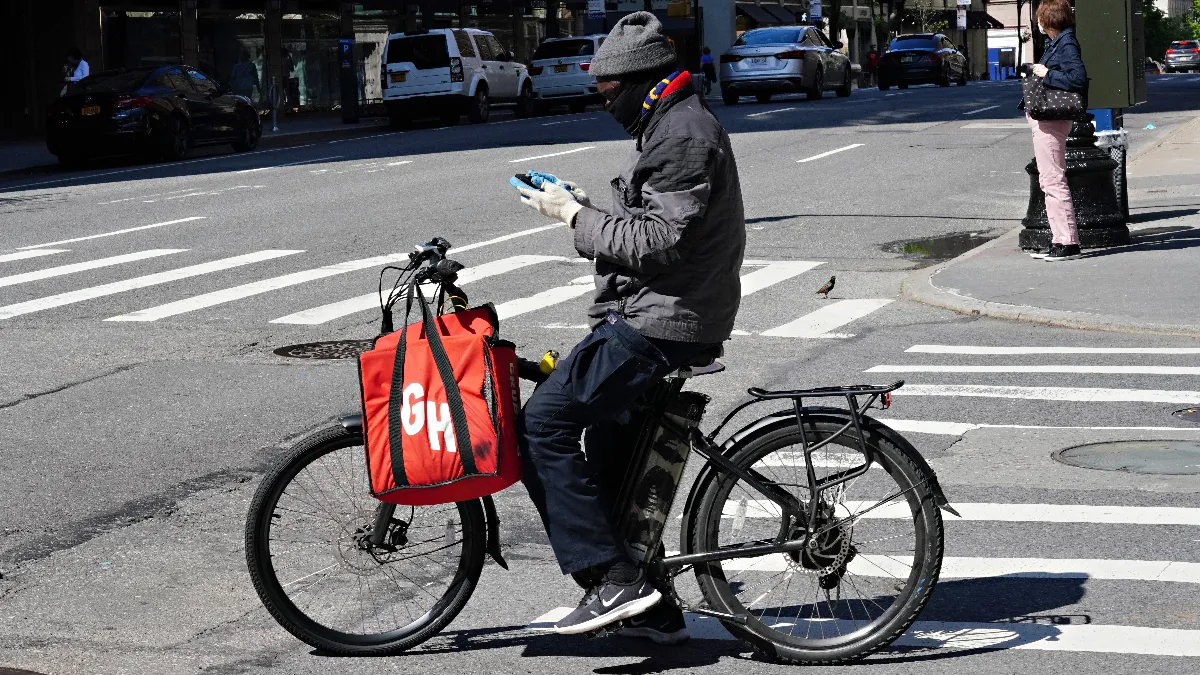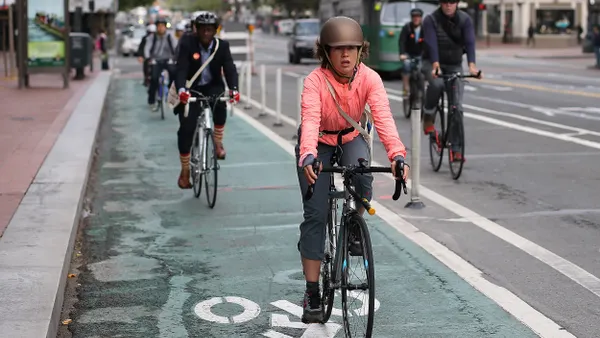Chicago filed two consumer protection lawsuits against DoorDash and Grubhub on Friday for "engaging in deceptive and unfair business practices that harm restaurants and mislead consumers," according to a press release. This is the first comprehensive law enforcement action against meal delivery companies in the U.S., the city said.
The lawsuits, which are the result of an investigation led by Business Affairs and Consumer Protection and the city's law department, seek "injunctive relief in the form of greater transparency and other conduct modifications, restitution for restaurants and consumers hurt by these predatory tactics and civil penalties for violations of the law," per the release.
These allegations are the latest examples of municipalities pushing back against foodservice delivery companies.
Massachusetts's attorney general sued Grubhub earlier this year for violating its temporary fee cap. In June, Uber Eats added a disclosure on its app in Washington, D.C., and Pennsylvania to provide better pricing transparency concerning the difference between in-app orders and in-restaurant order prices as part of a collaboration with the local attorneys general. Both D.C. and Philadelphia have temporary delivery fee caps in place. New York City and San Francisco also passed permanent delivery fee caps this year to keep costs down for recovering restaurants.
But Chicago's litigation goes far beyond attempting to limit the power of these third-party aggregators. The city alleges these platforms advertise services from unaffiliated restaurants without their consent and lure companies with small upfront fees only to charge more fees at the end of a transaction. The city also claims delivery aggregators conceal that menu prices on their platforms are often significantly more expensive than prices available if a diner were to order from a restaurant directly.
"As we stared down a global pandemic that shuttered businesses and drove people indoors, the defendants' meal delivery service apps became a primary way for people to feed themselves and their families, as well as support local restaurants," Chicago Mayor Lori Lightfoot said in the press release. "It is deeply concerning and unfortunate that these companies broke the law during these incredibly difficult times, using unfair and deceptive tactics to take advantage of restaurants and consumers who were struggling to stay afloat."
Chicago also breaks down alleged misconduct specific to each company. Grubhub is accused of publishing deceptive phone numbers and charging for calls that didn't result in orders; creating "imposter websites" for restaurants which route consumers to Grubhub; and violating the city's emergency commission fee cap of 15%, which went into place in November 2020. Chicago also alleges Grubhub's "save restaurants" campaigns during the pandemic were "deceptive" because participating restaurants were forced to extend their contracts, cover the cost of the promotions and pay full commission on orders.
Additionally, the city accuses DoorDash of misleading consumers to think they were tipping drivers directly when that money actually was used to subsidize DoorDash payments to Dashers; and imposing a "Chicago fee" of $1.50 on every order, which Chicago claims implied the fee was required by or paid to the city when DoorDash was the only beneficiary.
"We heard from the hospitality industry and Chicago's consumers about these unfair practices and this action demonstrates we will hold non-complying businesses accountable," Acting BACP Commissioner Kenneth Meyer said in the press release.
Grubhub, DoorDash respond to Chicago's allegations
Both Grubhub and DoorDash deny that they partook in any deceptive business practices and reiterated their ongoing support for restaurants.
"We are deeply disappointed by Mayor Lightfoot's decision to file this baseless lawsuit. Every single allegation is categorically wrong and we will aggressively defend our business practices. We look forward to responding in court and are confident we will prevail," a Grubhub spokesperson said in an email.
Regarding Chicago's accusations about listing non-partner restaurants, Grubhub said non-partner restaurants can be removed from the platform through an email request and that only a small percentage of non-partner restaurants have asked to be taken off the site. Grubhub also say it has made its prices and fees — which are broken down by delivery fee, service fee or small order fee — clear in its Terms of Use, which every diner agrees to before using its platform, as well as in its marketing materials and its order/checkout flow. Regarding menu prices, Grubhub has a provision within its standard restaurant contracts that prohibits price inflation.
As of Aug. 23, Grubhub no longer has phone orders. The company replaced the channel with an assisted ordering feature that gives a customer a three-choice prompt. And while Grubhub created microsites and registered domains in the past to boost a brand's online presence at no charge, the company no longer offers this practice and has been transferring domains at any restaurant's request, according to a company email.
Grubhub also denies that its campaigns to help restaurants during the pandemic were deceptive and claims that the terms of its Supper for Support program were clearly disclosed to restaurants, adding that the program provided over $15 million in subsidies for restaurants, and more than $500,000 of this money went to Chicago establishments. Grubhub also denies violating the city's temporary fee cap, saying that it complied for the duration that it was in place and even extended it after the cap expired. The company added that credit card processing fees were not included in the language of the law since a restaurant would pay these fees regardless and that Grubhub was acting as a pass-through.
DoorDash's response to Chicago's accusations was very similar.
"This lawsuit is baseless. It is a waste of taxpayer resources, and Chicagoans should be outraged. DoorDash has stood with the City of Chicago throughout the pandemic, waiving fees for restaurants, providing $500,000 in direct grants, creating strong earning opportunities, and delivering food and other necessities to communities in need. This lawsuit will cost taxpayers and deliver nothing," a DoorDash spokesperson said in an email.
DoorDash said that in November 2020 it stopped adding new restaurants to its platform if they didn't have a partnership agreement, and that any restaurants not wishing to be on the platform will be removed within 48 hours of DoorDash being notified. The company also changed its tipping policy in 2019, allowing Dashers to see the minimum amount they will earn on delivery, and reiterated that Dashers earn 100% of tips.
Chicago's accusations against the companies aren't new — many municipalities are trying to gain control of a largely unregulated market, which thrived during the pandemic. Grubhub's phone order process has been generating complaints since 2019, for example, when the New York City Council threatened to pursue legislation over the practice. Earlier this year, the company settled a class-action lawsuit accusing it of creating "misleading pages" for non-partnered restaurants. Last year, DoorDash settled a $2.5 million lawsuit over its prior tipping model.
It's possible such persistent legal actions by municipalities could deter delivery aggregators from operating in certain markets, which could pose a major challenge as restaurants increasingly rely on those services to stay afloat. No company has proposed doing so at this time, however. But jurisdcitional disparities in market rules create a challenge for third-party companies that operate nationwide. As delivery continues to grow and stabilize as a major part of the restaurant industry's sales mix, consistent regulations and compromise will likely continue.











